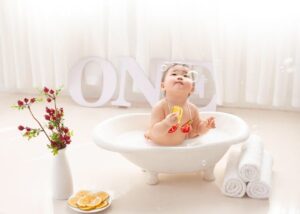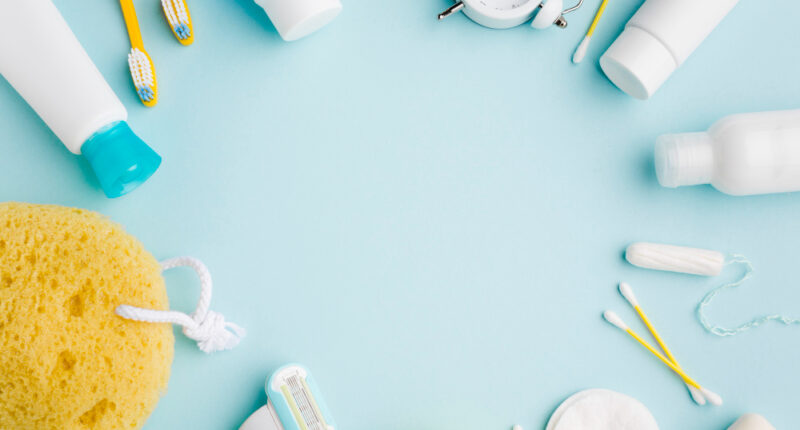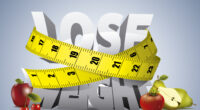Keeping your baby clean and healthy is one of the most important aspects of parenting. Good hygiene practices not only ensure your baby’s well-being but also help establish healthy habits that will benefit them throughout their life. In this blog, we’ll explore essential tips for maintaining baby hygiene, from bathing and diaper changes to oral care and general cleanliness.
1. Bathing Your Baby
Bathing your baby is a crucial part of their hygiene routine, but it doesn’t need to happen every day. Here are some tips for safe and effective baby baths:
Frequency: For newborns, 2-3 times a week is sufficient. Daily baths can dry out their sensitive skin.
Bathing Supplies: Use a gentle, baby-specific soap and shampoo. Have a soft washcloth, a cup for rinsing, and a hooded towel ready.
Bathing Method: Fill the baby tub with a few inches of warm water (about 37°C or 98.6°F). Gently support your baby’s head and neck as you wash them.
Safety: Do not leave your baby unattended in the bath. Always keep one hand on your baby to prevent slipping.

2. Diaper Changes
Frequent diaper changes are essential to keep your baby’s skin healthy and prevent rashes. Here’s how to ensure hygienic diaper changes:
Frequency: Change diapers every 2-3 hours or immediately if soiled.
Cleaning: Use baby wipes or a damp cloth to clean your baby’s diaper area thoroughly. For newborns, plain water or alcohol-free wipes are best.
Drying: Pat the area dry with a soft towel before putting on a new diaper.
Creams and Powders: Use diaper rash cream if needed to protect your baby’s skin. Do not use talcum powder, this is harmful to babies if inhaled.
3. Oral Hygiene
Oral hygiene is important even before your baby’s teeth come in. Start early to promote healthy gums and future dental health:
Gum Care: Wipe your baby’s gums with a clean, damp cloth after feedings.
First Tooth: Once your baby’s first tooth appears, use a small, soft-bristled toothbrush with a smear of fluoride toothpaste (about the size of a grain of rice).
Routine: Brush your baby’s teeth twice a day and schedule their first dental visit by their first birthday.
4. Nail Care
Keeping your baby’s nails trimmed helps prevent scratches and injuries. Here’s how to do it safely:
Tools: Use baby nail clippers or a nail file designed for infants.
Timing: Trim nails when your baby is calm or sleeping to reduce the risk of accidental cuts.
Technique: Gently press the finger pad away from the nail and trim straight across. Please be cautious and avoid cutting too close to the skin.
5. Ear and Nose Care
Maintaining clean ears and nose is important for your baby’s comfort and health:
Ears: Clean the outer ear with a damp washcloth. Avoid using cotton swabs inside the ear canal, as they can cause injury.
Nose: Use a nasal aspirator or bulb syringe to gently remove mucus from your baby’s nose if they are congested.

6. Clothing and Laundry
Proper clothing and laundry practices contribute to your baby’s hygiene:
Clothing: Dress your baby in clean, comfortable clothes appropriate for the weather. Avoid tight clothing that can irritate the skin.
Laundry: Wash baby clothes, bedding, and towels with a gentle, hypoallergenic detergent. Make sure to rinse thoroughly to remove all soap residue.
7. Hand Hygiene
Teaching good hand hygiene early helps prevent the spread of germs:
Parents and Caregivers: Always wash your hands before handling your baby, especially after diaper changes or using the bathroom.
Baby’s Hands: Wipe your baby’s hands with a damp cloth regularly, especially before meals and after playing.
8. General Cleanliness
Maintaining a clean environment is essential for your baby’s health:
Home Cleanliness: Regularly clean and disinfect surfaces, toys, and baby gear.
Outdoor Safety: When outside, ensure your baby’s play area is clean and free from potential hazards.
Maintaining good hygiene for your baby is a cornerstone of their health and well-being. By following these essential tips, you can ensure that your little one stays clean, comfortable, and healthy. Establishing these habits early on will set the foundation for a lifetime of good hygiene practices. Remember, consistency is key, and always be gentle and patient with your baby during these routines. Your efforts will pay off in their happy, healthy smiles.









